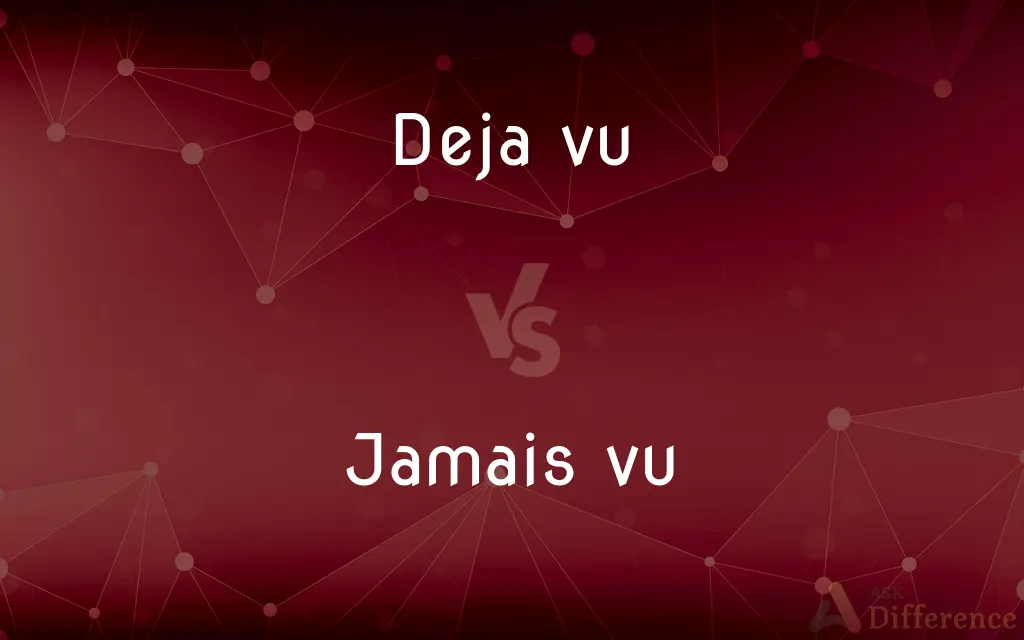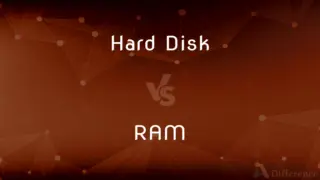Deja vu vs. Jamais vu — What's the Difference?
By Tayyaba Rehman — Published on November 11, 2023
Deja vu is the feeling that an experience has happened before; Jamais vu is the sensation that a familiar situation feels unfamiliar.

Difference Between Deja vu and Jamais vu
Table of Contents
ADVERTISEMENT
Key Differences
Deja vu and Jamais vu are both terms that describe peculiar feelings related to familiarity and memory. Deja vu is a French term meaning "already seen," and it describes the eerie sensation that a current situation has been experienced before, even if it hasn't. On the other hand, Jamais vu, meaning "never seen," refers to the strange feeling that a familiar situation or word suddenly feels completely foreign or new.
The phenomenon of Deja vu is common, with a significant portion of the population having experienced it. These instances can be fleeting, lasting only a moment, but they are often accompanied by a strong sense of recognition. In contrast, Jamais vu is less common. When someone encounters a Jamais vu, they might feel as though they're seeing a well-known person, place, or thing for the very first time.
The exact causes of Deja vu and Jamais vu are not entirely understood. Researchers believe Deja vu might be related to a temporary misfire in the brain, where experiences are incorrectly tagged as memories. Jamais vu, on the other hand, might be tied to fatigue or overexposure to a particular stimulus, causing it to momentarily seem unfamiliar.
Both Deja vu and Jamais vu are generally considered harmless. While they can be unsettling, these phenomena are typically not indicators of any underlying health issues. However, frequent experiences of either, especially in quick succession, could be indicative of neurological conditions and might warrant consultation with a medical professional.
Comparison Chart
Meaning in French
"Already seen"
"Never seen"
ADVERTISEMENT
Description
Feeling something has happened before
Familiar situation feels unfamiliar
Commonality
More common
Less common
Possible Cause
Brain misfire
Fatigue or overexposure
Association with Health Issues
Typically harmless, rare exceptions
Typically harmless, rare exceptions
Compare with Definitions
Deja vu
Often described as a glitch in one's memory.
Experiencing Deja vu can feel like a hiccup in time.
Jamais vu
Often likened to a momentary memory lapse.
For a moment, her own reflection gave her a sense of Jamais vu.
Deja vu
A cognitive anomaly linked to the brain's memory centers.
Scientists often study Deja vu to understand memory better.
Jamais vu
A cognitive oddity often related to overexposure.
Staring at a common object can sometimes trigger Jamais vu.
Deja vu
An eerie sensation of recognition without a clear source.
She brushed off the Deja vu, knowing she'd never been there before.
Jamais vu
A feeling of foreignness in a well-known environment.
Walking into his childhood home, he felt an unsettling Jamais vu.
Deja vu
A feeling of familiarity in a new or unfamiliar setting.
Even though he had never visited the town, he felt Deja vu.
Jamais vu
The opposite of Deja vu in terms of familiarity.
While Deja vu feels like a memory replay, Jamais vu is its unsettling counterpart.
Deja vu
A sensation that a current experience has occurred in the past.
When she entered the room, she had a strong sense of Deja vu.
Jamais vu
The experience of seeing something familiar as if for the first time.
Reading the word repeatedly gave him a sense of Jamais vu.
Common Curiosities
How often do people experience Jamais vu?
It's less common than Deja vu and often linked to overexposure or fatigue.
What causes Deja vu?
The exact cause is unknown, but it might be related to a misfire in the brain's memory centers.
What is Deja vu?
A feeling that a current experience has occurred before.
How is Jamais vu different?
It's the sensation that something familiar feels completely unfamiliar.
Is Deja vu common?
Yes, many people experience Deja vu occasionally.
Is there any way to stop Deja vu?
There's no known method, but recognizing the sensation can help one move past it.
Can Deja vu indicate an underlying health issue?
While typically harmless, frequent episodes might warrant medical consultation.
Is Jamais vu associated with any diseases?
It's generally harmless, but regular occurrences could indicate neurological issues.
And Jamais vu?
Possibly related to overexposure to a stimulus or fatigue.
How long do Deja vu episodes last?
They're usually fleeting, lasting only moments.
Does everyone experience Jamais vu?
Not everyone, and its frequency varies among individuals.
Are Deja vu and Jamais vu scientifically studied?
Yes, they're subjects of interest in cognitive science and neurology.
Is there any way to prevent Jamais vu?
Recognizing fatigue or overexposure and taking breaks might help.
Can you induce Jamais vu?
Repeatedly reading a word or staring at an object might trigger it.
Do other cultures experience Deja vu and Jamais vu?
Yes, though the names and interpretations might vary.
Share Your Discovery

Previous Comparison
Hard Disk vs. RAM
Next Comparison
Gelato vs. Ice CreamAuthor Spotlight
Written by
Tayyaba RehmanTayyaba Rehman is a distinguished writer, currently serving as a primary contributor to askdifference.com. As a researcher in semantics and etymology, Tayyaba's passion for the complexity of languages and their distinctions has found a perfect home on the platform. Tayyaba delves into the intricacies of language, distinguishing between commonly confused words and phrases, thereby providing clarity for readers worldwide.











































